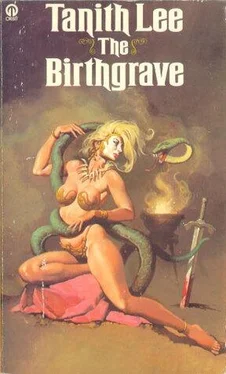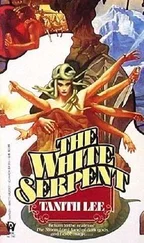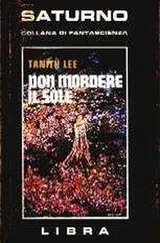The need to cling to something stable was unbearable. I turned to the metal pillar and hid my face against it, shutting my eyes, holding to it, as if to let go would be to send myself spinning into the black emptiness forever.
And under my hands, the pillar throbbed and whined.
Trees, growing from metallic channels in the floor, spread their green feathers against the high roof, dusted black feathers of shadows across the painted walls of this indoor garden of another planet.
Elongated red flowers spilled like blood from urns of glass.
I sat among the flowers, smelling their strange scent, watching him look at me. I was not entirely sure how I had come here. There had been sound and burning lights, and alarms like the alarms of war. Their ship had responded to my horror until Ciorden presumably managed to quiet it. Then Rarm must have brought me to this place, as if these strange growing things could put an end to the hollow icy tension in the pit of my belly, which had come with the knowledge of the blackness all around me. I was glad to have inconvenienced them. Yet it was all the pleasure I had.
“You’re a risk to my ship,” Rarm said. “Your mind holds a power which you can’t or won’t control. You could kill us all.”
“Then let me go.”
He came and sat beside me, and I turned away from him, staring at the red flowers.
“Let me go,” I repeated.
“Can’t you see your own danger? Your life is misery to you. The computer can analyze all our minds, and that is what it has to say of you. If you let me, I can help you.”
“Why?”
“Not as an experiment, which is what you think.”
“I am,” I said, tasting the bitterness of the words, “inferior to your race.”
“Inferior is a word you misuse. Men of my worlds have watched your planet for many years, because it held men like themselves—human men. Primitive by our standards, perhaps. Our bloody struggles are in the past, yours are to come. Time is the barrier, only time. And time does not make superiors or inferiors, only differences. Let me help you.”
“What can you do?” I said coldly.
“Not what I can do. The computer.”
“No.”
“Why ‘No’? Ciorden believes there’s an answer to this thing which locks you out from yourself—and the computer has it.”
“No.”
“Yes. Are you afraid to be answered?”
“I am afraid,” I said. “That is enough.”
“Of what?” He grasped my shoulders suddenly, turning me toward him, his hands insistent, strong, well-remembered.
“You are Darak,” I murmured. “Darak in the inn-room at Ankurum, in the dark tent on the South Road.”
“Through the computer, with the help of Ciorden as your intermediary,” he said levelly, “you can relive, in the space of a few hours, your life from the moment of your birth.”
“No,” I said. I began to cry. “Let me go.”
Abruptly he stood up.
“Then I must do it,” he said.
He turned toward the doors. I ran after him. I shouted at him and tried to hold him back, but I did not seem to have any strength. I did not want him to know me as I knew myself, could not bear it. And then there was a barrier between us. I could neither feel nor see it, but neither could I pass by it. He had reached the doors.
“Before,” he said, “I was unprepared for you. Now I take no chances. I am the captain of this ship, and my final instruction overrides even your powers. That instruction has been given. Without a contrary order from me, you will not be allowed to follow me, though you may return to your room. Any attempt to undermine the computer with emotion will result in your instant anesthesia. Do you understand me?”
“Please—” I said.
But the doors had shut behind him.
For a long time I lingered in that garden room. I touched the flowers and they opened briefly. The shadow of the trees stirred in a little artificial breeze.
My thoughts came spasmodically. I longed to hide myself, to seek out a death I could not achieve.
Shame and despair and the unknown dread pulled me down.
Finally I left the garden, and it let me. In the corridor I realized I did not know the way back to my rooms. At once a beam of light struck down from the ceiling, pointing ahead of me. I walked toward it numbly, and it moved away. It led me through many corridors, and upward on another of the moving floors. Twice I passed a group of men, who fell silent as I went by them, following the beam. I sensed intense interest, and little liking. I was a danger to them, yet rare and curious for all that, like the orchids of the north which will snap off a man’s finger for the meat. I reached the glassy place, crossed it, and entered the blue silence which was the only part of this ship I might be safe in.
The bed slid from the wall, and I went to it, my body heavy as lead.
I lay silent, thinking how he raped my mind in the light webbed room. I thought of the emptiness and the void in me, terrible as the void which had swallowed the ship.
And then a new thought came, a little sharp thought, burning its way into my skull. I recalled what I had feared at their hands when they took me. Their power was vast, the power of the computer-brain seemed godlike.
“Kill me,” I whispered to the silence. “Let me die.”
A deep humming filled the room, a frenzied angry sound.
“Serve me,” I said. “Obey me. Death is what I want. Give me death.”
My bed trembled. There came the drone of distant thunder. A new, a limitless cold settled on me. My eyes darkened. Tears choked me. It had given me what I wanted. And perhaps it was strong enough, stronger than the swords of Vazkor’s soldiers, more lasting than the grave in the desert, and the fallen tower at Eshkorek.
Something glittered through the dark. A knife swooping down on me from the light-glow of the ceiling. I felt my breathing stop.
“Wake up,” Darak said to me impatiently.
“Let me alone,” I muttered. “I am dead.”
“No, you’re not dead, goddess. Drink this.”
Something forced itself under the fold of the shireen, and into my mouth. Thin cool fluid found my throat.
I swallowed, and pushed the thing away. Without opening my eyes, I sat up. Whirling colors filled my brain. To escape them I opened my eyes after all. I saw the blue room, and could not remember where I was. I laughed stupidly at Darak’s angry face. I could not understand why he was so angry.
“Dead.” He tried the word contemptuously on his tongue. “Didn’t it occur to you that a machine especially programmed to bring comfort and life to its crew would also be programmed never to kill them? If you were a savage or a barbarian it would make some sense—but you can think and reason.”
He stood up. “My whole ship damaged if I hadn’t blocked you with that one inspired order. Anesthesia the moment you presented the computer with an emotional problem.” He leaned over, took my shoulders, and shook me violently. “Couldn’t you trust me?”
“Darak,” I said.
“No, I’m not Darak Gold-Fisher, the hill-bandit charioteer. Neither am I Vazkor the murderer, the first successful step toward death and darkness that your planet has so far taken. I am Rarm Zavid, the fool.
Up on your feet.” He lifted me, and held me upright. “Drink some more of this. Now walk.” We walked.
I began to recall where I was and all that had happened. I tried very hard not to, but he would not allow me. Finally he let me go, and I saw his face clearly for the first time. It was strained, concentrated into a look of frustration and regret rather than anger. I remembered that he and Ciorden had lived in my mind in the Hub. And I hated them.
“Has my life brought you joy, Rarm?” I asked him, spite fully sweet in my shame.
Читать дальше












